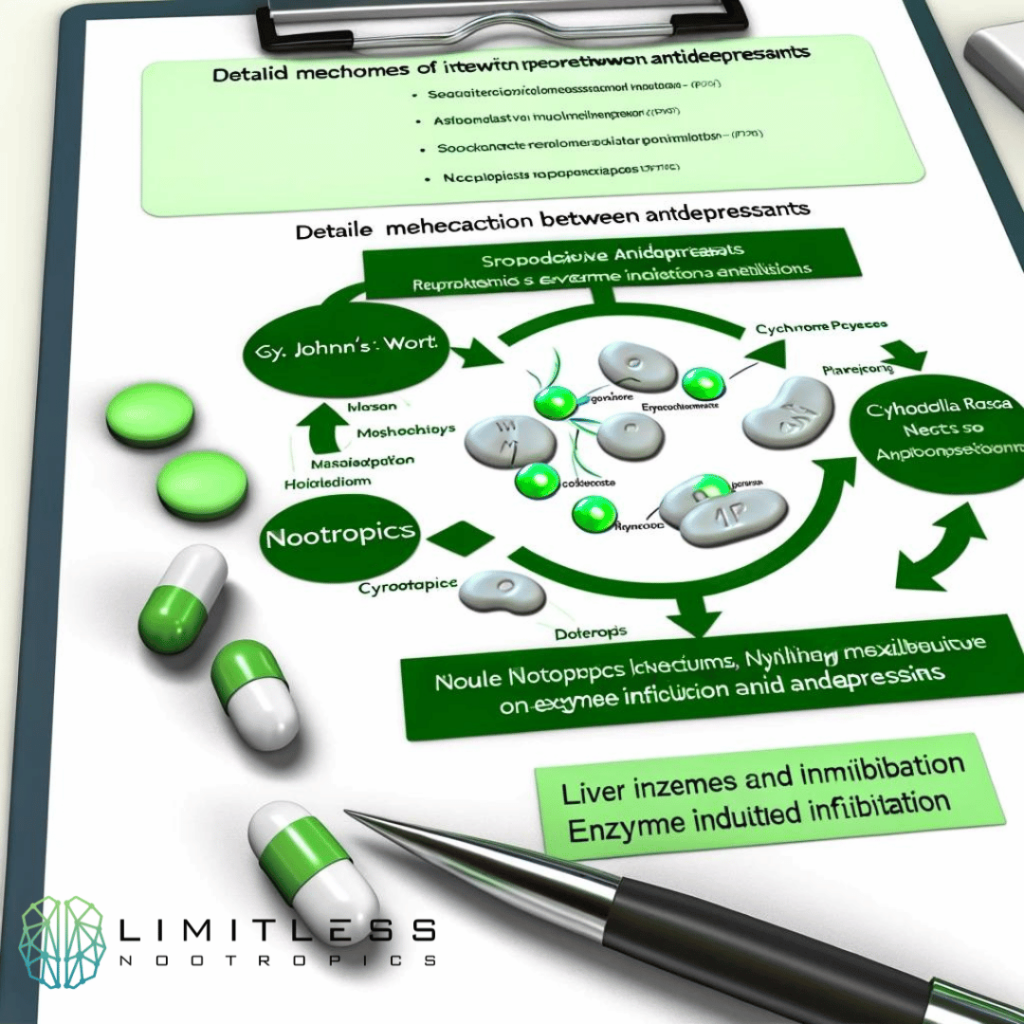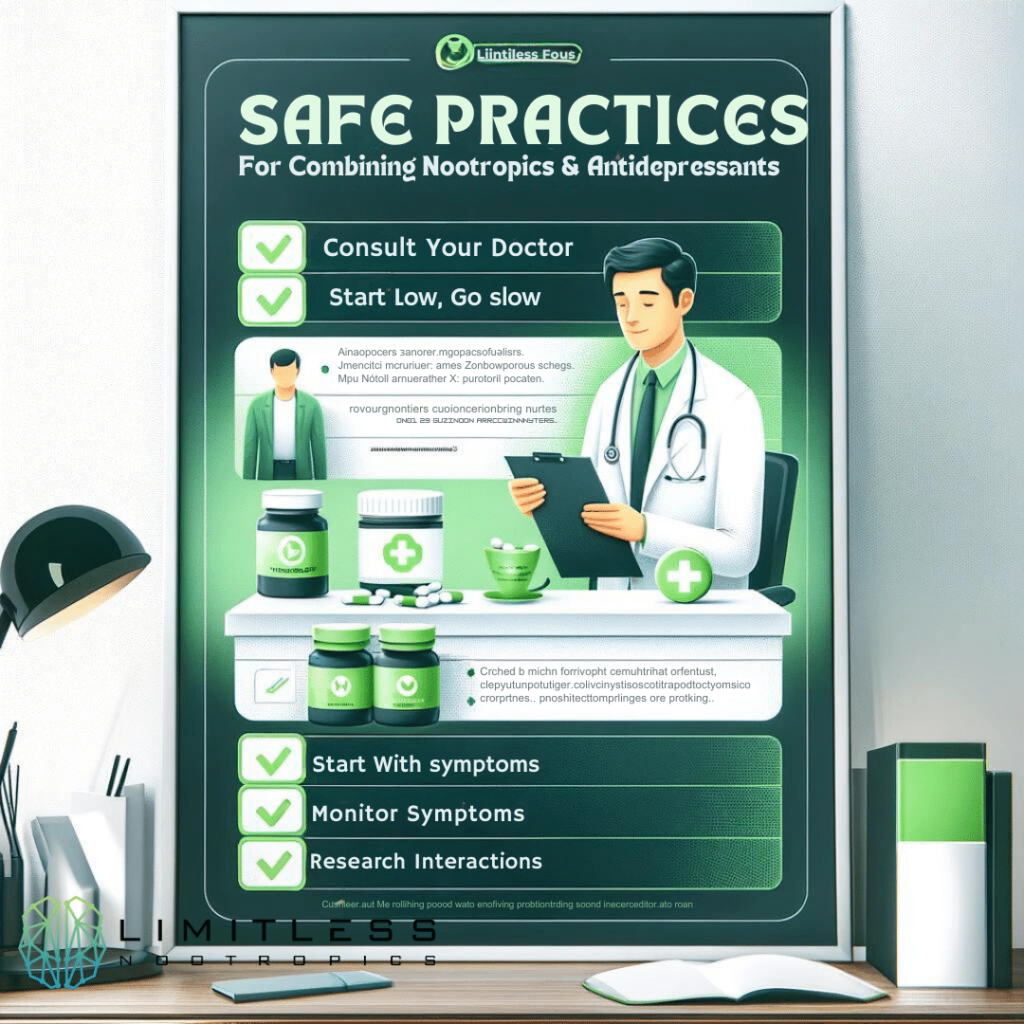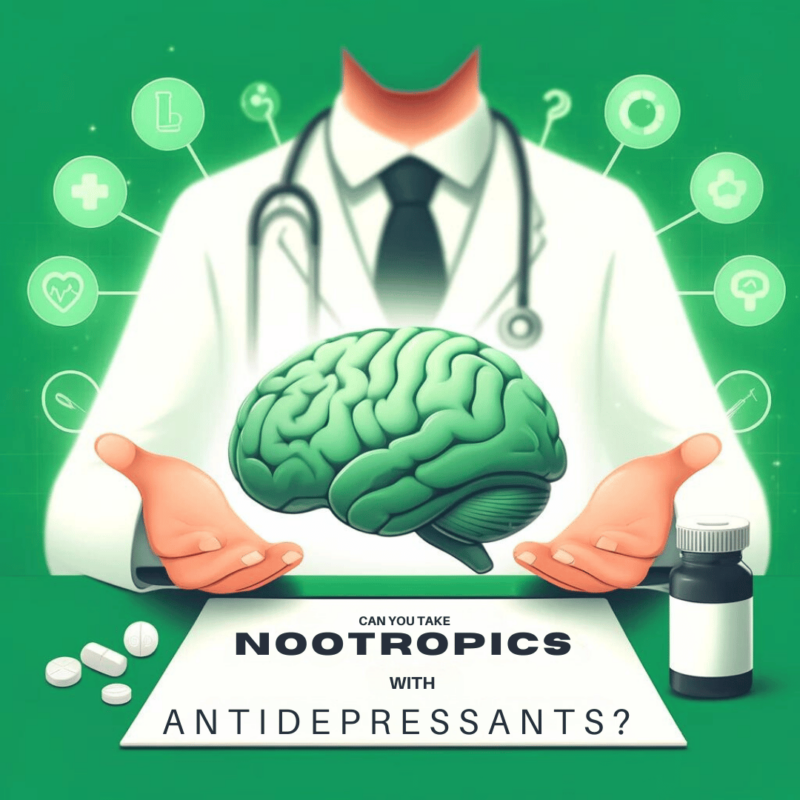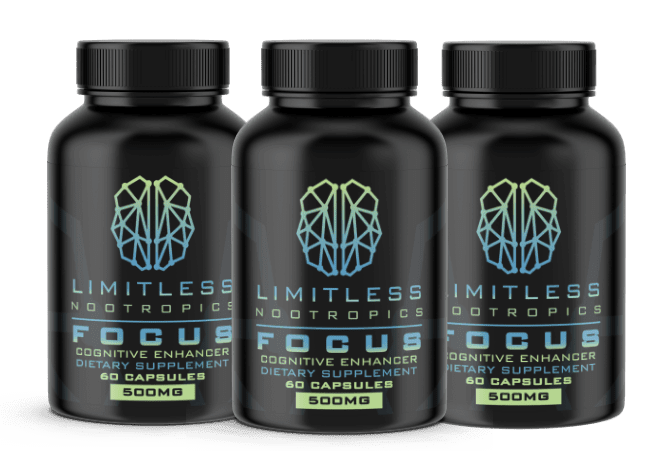So you’re on an antidepressant but still looking to increase your cognitive function.
Can you take nootropics with antidepressants?
Combining nootropics with antidepressants is a common query among those looking to boost cognitive function while managing mental health conditions.
Understanding the interactions between these substances is crucial for ensuring safety and effectiveness.
This guide explores the potential benefits, risks, and what you need to know before mixing nootropics with antidepressants.
Understanding Nootropics and Antidepressants
Nootropics, often referred to as “smart drugs,” are substances that can enhance cognitive function, memory, creativity, and motivation.
Antidepressants are medications prescribed to treat depressive disorders and other conditions by altering brain chemistry.
Potential Benefits of Combining Nootropics and Antidepressants
- Enhanced Cognitive Function: Some nootropics can improve focus, memory, and overall cognitive performance, which might complement the mood-stabilizing effects of antidepressants.
- Mood Improvement: Certain nootropics have mood-enhancing properties that could synergize with antidepressants, potentially offering better emotional stability.
Risks and Considerations
Combining nootropics with antidepressants is not without risks. Here are key considerations:
- Serotonin Syndrome: Combining substances that affect serotonin levels can lead to an excess, causing serious complications like serotonin syndrome. Read more about serotonin syndrome.
- Blood Thinning: Some nootropics may have blood-thinning effects, which can interact negatively with certain antidepressants. Learn about blood thinning risks.
- Drug Interactions: The interaction between nootropics and antidepressants can vary based on the specific substances used. Some combinations might lower or have no significant drug interaction. Read about lower or no drug interaction and more on interactions.
- GABAergic Effects: Nootropics that affect GABA levels may reduce the effectiveness of antidepressants. Explore how GABA impacts drug efficacy.
- Metabolism Interference: Some nootropics may affect the liver enzymes responsible for metabolizing antidepressants, potentially leading to either higher or lower drug levels in the bloodstream. This is especially important for medications with a narrow therapeutic index.
- Individual Variability: Individual responses to combining nootropics and antidepressants can vary significantly, depending on factors like genetics, overall health, and the specific medications involved.

Detailed Mechanisms of Interaction
Understanding the specific mechanisms through which nootropics interact with antidepressants is vital for ensuring safe use. One key area is the effect on liver enzymes, particularly the cytochrome P450 enzyme family. These enzymes are responsible for metabolizing many drugs, including antidepressants.
- Induction and Inhibition: Some nootropics can induce or inhibit these enzymes, affecting the metabolism of antidepressants. For example, an inducer like St. John’s Wort can increase the metabolism of SSRIs, potentially reducing their efficacy. Conversely, inhibitors like Rhodiola Rosea can slow down metabolism, increasing the risk of side effects.
- Cytochrome P450 Enzymes: Many antidepressants, such as SSRIs and SNRIs, are metabolized by cytochrome P450 enzymes. Nootropics that inhibit these enzymes can lead to higher levels of antidepressants in the blood, increasing the risk of toxicity. Conversely, inducers can lower antidepressant levels, reducing their effectiveness.
Expanded List of Safe and Risky Combinations
Here’s an expanded list of common nootropics and their potential interactions with different classes of antidepressants:
| Nootropic | SSRI Interaction | SNRI Interaction | MAOI Interaction | Notes |
|---|---|---|---|---|
| Bacopa Monnieri | Generally Safe | Generally Safe | Caution Advised | Known for its cognitive benefits and relatively low risk of interaction. |
| Rhodiola Rosea | Potential Risk of Serotonin Syndrome | Potential Risk of Serotonin Syndrome | Caution Advised | Can affect serotonin levels; use with caution. |
| Lion’s Mane | Lower or No Drug Interaction | Lower or No Drug Interaction | Lower or No Drug Interaction | Generally considered safe with minimal interaction risks. |
| L-Theanine | Generally Safe | Generally Safe | Generally Safe | Known for its calming effects and safety profile. |
| Ginkgo Biloba | Risk of Blood Thinning | Risk of Blood Thinning | Risk of Blood Thinning | Can increase bleeding risk, especially when combined with antidepressants that affect serotonin. |
| St. John’s Wort | Induces Cytochrome P450 Enzymes | Induces Cytochrome P450 Enzymes | Not Recommended | Strong inducer of liver enzymes; can significantly reduce antidepressant efficacy. |
| Piracetam | Generally Safe | Generally Safe | Caution Advised | May enhance cognitive function without major interactions, but monitor closely. |
More Comprehensive Precautions
When considering combining nootropics with antidepressants, follow these detailed precautions:
- Consult with a Healthcare Professional:
- Discuss your current medications and any nootropics you are considering.
- Ask about potential interactions and specific risks associated with your medication.
- Dosage Adjustments:
- Start with the lowest possible dose of nootropics and adjust gradually.
- Monitor how your body responds and adjust the dosage under medical supervision.
- Monitoring for Side Effects:
- Be vigilant for any side effects such as increased anxiety, dizziness, or gastrointestinal issues.
- Report any adverse reactions to your healthcare provider immediately.
- Specific Symptoms to Watch For:
- Symptoms of serotonin syndrome include agitation, hallucinations, rapid heart rate, and increased body temperature.
- Signs of increased bleeding risk include easy bruising, prolonged bleeding from cuts, and unusual nosebleeds.
- Lifestyle and Dietary Considerations:
- Maintain a consistent routine and avoid major lifestyle changes that could affect medication and nootropic efficacy.
- Ensure your diet supports overall health and complements your medication and supplement regimen.
Questions to Ask Your Doctor
When preparing to discuss combining nootropics with antidepressants with your doctor, consider asking these questions:
- General Safety:
- Is it safe for me to take nootropics with my current antidepressant?
- Are there specific nootropics that are safer to combine with my medication?
- Dosage and Administration:
- What dosage of the nootropic should I start with?
- How should I adjust the dosage if I experience side effects?
- Potential Interactions:
- How might nootropics interact with my antidepressant?
- Are there specific nootropics I should avoid due to potential interactions?
- Monitoring and Follow-up:
- What symptoms or side effects should I watch for?
- How often should I check in with you to monitor my progress?
- Individual Considerations:
- How might my individual health conditions affect the safety and efficacy of combining these substances?
- Are there specific lifestyle or dietary changes I should make to support this combination?
- Alternative Options:
- Are there alternative cognitive enhancers that might be safer for me to use?
- What other strategies can I use to boost cognitive function without risking interactions?

Safe Practices for Combining Nootropics with Antidepressants
To minimize risks, follow these guidelines:
- Consult Your Doctor: Always discuss with your healthcare provider before starting any new supplement, especially if you are on medication.
- Start Low, Go Slow: Begin with a low dose of nootropics and gradually increase to monitor for any adverse reactions.
- Monitor Symptoms: Keep track of any changes in mood, cognitive function, or physical health and report them to your doctor.
- Research Interactions: Investigate the specific interactions between your prescribed antidepressant and the nootropic you plan to take.
Conclusion
Can you take nootropics with antidepressants? The answer depends on various factors, including the specific nootropics and antidepressants involved, as well as individual health conditions.
By consulting with healthcare professionals, starting with low doses, and staying informed about potential interactions, you can safely explore the cognitive benefits of nootropics alongside your antidepressant regimen.
Remember to always prioritize safety and professional guidance when considering any changes to your medication or supplement routine.
If you’re looking for a nootropics with minimal drug interaction, look no further than Limitless Focus.


